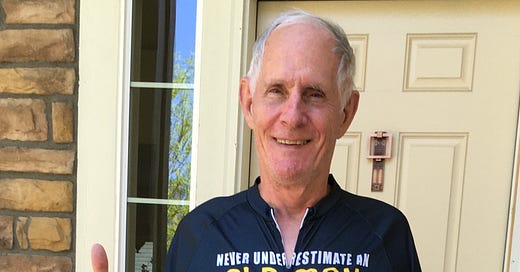Two and a half years ago - to the day - I experienced a life-changing (to say the least!) event.
Some readers know the story, so I’ll spare the elaborate details. Executive summary: I crashed going over a jump on a mountain bike, suffered 3 neck breaks, a broken hip, rib fractures and a disabling spinal cord injury. Found unresponsive, I was helicoptered to a trauma center, had emergency surgery and spent a month in rehab (all Medicare would allow). I went home in a wheelchair with no normal bladder or bowel function and no ability to feed myself. I was lucky to have a loving, supportive partner. I need no sympathy. I’ve had a remarkable, albeit incomplete, recovery and am grateful for my good fortune.
But what has this to do with education, other than learning not to “get air” ever again? My experience in recovery is interestingly analogous to my beliefs about education and my convictions about the power of progressive education.
Starting with the wonderful care during in-patient rehab, I’ve had nearly a dozen occupational and physical therapists. Each one has provided encouragement, some new exercises or challenges, and an array of equipment; yoga mat, dumbbells, elastic cords, foam rollers, foam pads to stand on for balance, putty to squeeze, and more.
The specific uses of each of these things are not anyone’s idea of great fun. If I were to do each prescribed exercise in each modality each week it would comprise a full 40-hour work week. No thanks. I learned early on that most patients, particularly my age, don’t do much of anything between therapists’ visits.
I fairly quickly - months of work - learned to walk, regained basic life functions, and re-engaged with the world. After a year, I climbed a small mountain with my daughter, hiked 6 miles in the Rockies with daughter and granddaughter and cautiously re-mounted a bicycle, albeit with very reluctant “resignation” from my wife and medical team, initially accompanied by my son. I have losses to be sure, including the permanent loss of the violin - my very serious avocation. But, as mentioned, I’m grateful, not grieving anything.
To the point, finally. My most recent therapist and I were discussing the daunting array of things on my weekly therapeutic menu. As I’ve gained function, these exercises are more difficult to incorporate into the day. I prefer cycling, walking, hanging out with grandchildren, shopping or damn near anything but therapy. Yet I don’t want to lose what I’ve gained or regress. A dilemma? Not with a flipping of the narrative.
My therapist and I agreed on an approach that we should trademark! Instead of therapy as my life, I do my life as therapy.
I am acutely conscious of balance, so I have gradually tested my proprioceptive skills on the trails where I crashed (no big air!!). I lift grocery bags with my weaker left arm. I do sensory stimulation by feeling the stitching on the steering wheel while driving. I refuse a straw in restaurants to improve hand confidence and coordination. I take two stair steps at a time for leg strength. I stand on one foot while waiting in line. This therapist coined the phrase, “left hand week,” where I would try to do all right hand tasks (easy) with my left hand (not so much). There are endless ways to address therapeutic goals while living joyfully.
I still do a few targeted exercises, but my focus is on my life as my therapy.
And this is the essence of good progressive educational practice. The analogy may be imperfect, but it is powerful nonetheless. The best education is through experience, not prescribed routine. The best education is based on and incorporated into each student’s passions. Children and spinal cord injury patients learn best and most durably through mastery of things that matter to them, not through what matters to the teacher or therapist.
A good progressive teacher can offer myriad experiences that achieve learning goals by capitalizing on curiosity, creativity and imagination. Mathematics and physics are in Legos and baseball. History is in simulations that bring students into empathic understanding of the past. Biology is in every field and stream. Grammar is in the expression of each child’s story. Botany and chemistry are in the school kitchen. Democracy can be in every classroom. I could write a book about it. Er, I did.
Too much of current educational practice is tedious and meaningless. And, distressingly and ironically, these dull routines are depriving children of the life they are supposed to be learning about.
Therapy is not life and school is not life.
Life is the best therapy and life is the best education.
I’m going to head out soon for my daily mountain bike ride. Who knows what I’ll learn about my body and the world?





Thank you for your candor, your vulnerable life lesson plan, for paying clearest attention to empowering everyone to pursue choices based on tuned in mindful learning based on their potential and needs. I would grieve the loss of a piano, while keeping on showing up. Very warmly, JK
Bravo, Steve! I'm passing this on to my partner who is hating "therapy homework".
Miss you!